Nigel Gould-Davies, a Palmerstonian geopolitician and former British Ambassador to Belarus (2007-2009) now ensconced at the International Institute for Strategic Studies (IISS), published an op-ed in the New York Times on Jan. 1, under the charming headline, “Putin Has No Red Lines.” By which he means, he explained, that the West should ignore whatever Russia portrays as its tripwires for escalation, and plunge into provocations.
“Red lines are nearly always soft, variable and contingent, not etched in geopolitical stone,” he asserts, citing as his source for this reassurance the British Empire’s most infamous 19th- Century imperialist, Foreign Secretary, and Prime Minister, Lord Palmerston, the official who presided over the crushing of India’s Great Mutiny, the Opium Wars against China, and the support for the Confederate uprising against the U.S., amongst many other crimes.
“While national interests, as Henry Temple, Viscount Palmerston, said, may be eternal, the way they manifest themselves as specific commitments will reflect temporary, shifting circumstances — among them, relative power, perceptions of threat, domestic calculations and wider global trends. Diplomacy should therefore seek not to avoid an adversary’s red lines but to change them,” Gould-Davies writes.
Call him “Ghoul"-Davies. He views diplomacy and military policy as tools for behavioral modification: “Creative and assertive strategy does not pre-emptively constrain itself by fear of what the other side might find unacceptable. Rather, it coordinates all elements of a situation to induce an adversary to accept its goals,” he writes.
And that specifically requires rejecting fear of escalation into a nuclear confrontation as a valid consideration in deciding what policy options should be adopted. Like the British madmen at the Royal United Services Institute (RUSI) and the editors of The Economist earlier this year, this geopolitical genius lectures U.S. policymakers that they must be prepared to go to the brink: “Fear of escalation, thus, encourages an escalation of bluff” by the “adversary,” Russia.




